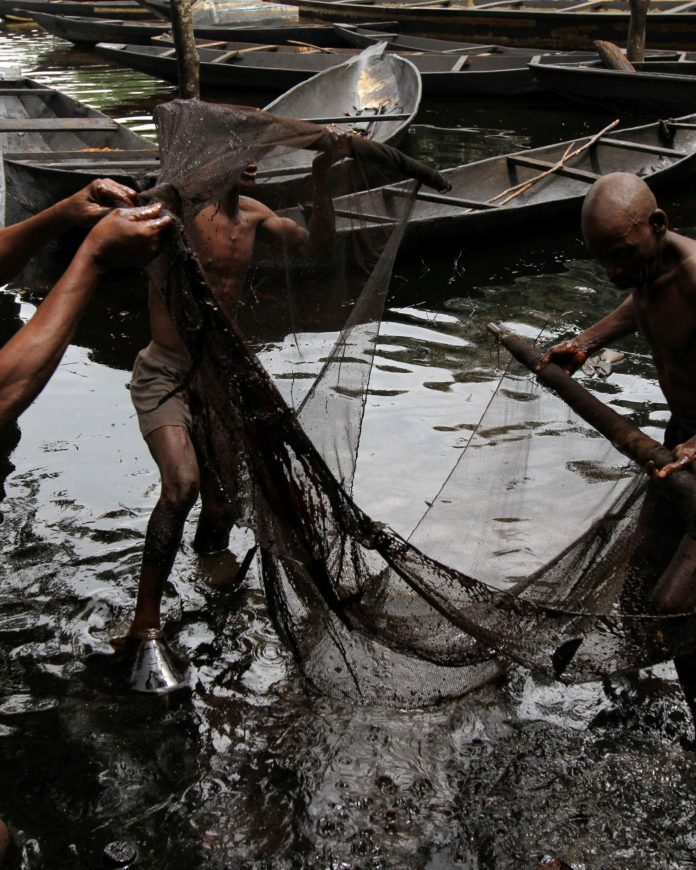IN early May, the Trans-Niger pipeline ruptured in B-Dere community, Gokana in Rivers State, pouring crude oil into homes and farms. Several families fled in terror as oil gushed past their doorsteps. For more than a week, the spill continued, coating houses and waterways in black slick and leaving the air heavy with the stench of petroleum. Residents said it became impossible to cook with open flames for fear of an explosion, forcing many to abandon their homes altogether.
The farmland now lies in ruin. Villagers were scooping crude into buckets and jerry cans in desperate attempts to salvage something from the disaster. Surrounding cassava and plantain fields are saturated: leaves and stems drip with oil, tubers rot in the soil, and once-fertile plots have been reduced to wastelands. By the time oil company crews arrived with tankers and bulldozers to stem the leak, the damage was already done. Days of unchecked gushing had turned farms into ecological graveyards and displaced households into temporary shelters. Officials noted down names of affected victims and took photographs, but families say what they really need is relief, medical support, and compensation.
Unfortunately, such scenes are not unusual. Oil spills have become routine across the Niger Delta- the home of Nigeria’s wealth, with several recorded in recent years. Companies often blame sabotage and crude theft, yet many pipelines are known to be decades old and corroded, prone to rupturing even without tampering. Experts insist that ageing infrastructure, poor maintenance, and inadequate oversight are just as much to blame as vandalism. The B-Dere incident illustrates this grim reality all too clearly.
The wider context makes the disaster even more troubling. More than a decade ago, the United Nations warned that Ogoniland faced an ecological crisis and called for a clean-up lasting 25 to 30 years. A government project, the Hydrocarbon Pollution Remediation Project (HYPREP), was launched to begin the process. Though it announced significant progress in its environmental restoration efforts in Ogoniland, during its mid-year report in June, a lot still needs to be done.
For locals who are predominantly fishermen and farmers, the toll has been catastrophic. Harvests have shrunk to a fraction of their former yields. Seeds rot in the ground, fish stocks vanish from once-busy rivers, and livestock suffer from ingesting toxic water. Families who once thrived on farming and fishing now struggle to feed themselves, while the land that sustained them for generations has become hostile and infertile.
What is needed is more than perfunctory gestures; it is systemic change. Oil companies must be held accountable not only for their operations but also for their negligence. They should ensure that they modernise their pipelines, strengthen monitoring systems, and invest in genuine remediation of contaminated soil and water. Regulatory agencies, too, often accused of complicity or inertia, must rise above compromise and enforce stringent environmental standards. The lives of Nigerians, particularly those in host communities, cannot continue to be traded for profit margins. Transparency in reporting spills, swift response in containment, and meaningful compensation for affected communities must become the norm, not the exception.
Also, regulators must enforce safety standards and hold operators accountable when spills occur. Communities must be included in decision-making, ensuring that recovery efforts reflect their needs rather than corporate interests. Above all, both government and industry must place human lives and livelihoods above profit.
The people of the Niger Delta have already borne far too much of the cost of oil production. The continuing tragedy of B-Dere, with its toxic air, dead trees and poisoned wells, shows that business as usual is no longer acceptable. Real change will take decades, but every day of delay adds to the suffering. The choice now lies with Nigeria’s leaders and its oil companies: either continue the cycle of neglect or finally deliver justice, restoration, and a healthier future for the communities of the Niger Delta.


